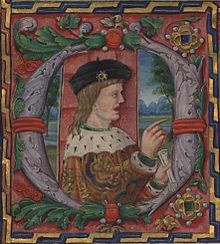Manuel I of Portugal
| Manuel I | |
|---|---|

Manuel I of Portugal, in a miniature from the frontispiece of the Livro 1 de Além-Douro of the Leitura Nova (penned 15??-1521).
|
|
| King of Portugal and the Algarves | |
| Reign | 25 October 1495 – 13 December 1521 |
| Acclamation | 27 October 1495 |
| Predecessor | John II |
| Successor | John III |
| Born |
31 May 1469 Alcochete, Portugal |
| Died | 13 December 1521 (aged 52) Lisbon, Portugal |
| Burial | Jerónimos Monastery |
| Spouses |
|
| Issue see details... |
|
| House | Aviz |
| Father | Ferdinand, Duke of Viseu |
| Mother | Beatrice of Portugal |
| Religion | Roman Catholicism |
| Signature | |
Manuel I (European Portuguese: [mɐ̃nʊˈɛɫ]; English: Emmanuel I; 31 May 1469 – 13 December 1521), the Fortunate (Port. o Afortunado), King of Portugal and the Algarves, was the son of Infante Ferdinand, Duke of Viseu, by his wife, the Infanta Beatrice of Portugal. His name is associated with a period of Portuguese civilization that was distinguished by significant achievements both in political affairs and the arts. In spite of its small size and population in comparison to the great land powers of Europe, Portugal, during Manuel`s reign, was able to acquire an overseas empire of vast proportions, the first in world history to reach global dimensions.
Manuel's mother was the granddaughter of King John I of Portugal, whereas his father was the second surviving son of King Edward of Portugal and the younger brother of King Afonso V of Portugal. In 1495, Manuel succeeded his first cousin, King John II of Portugal, who was also his brother-in-law, as husband to Manuel's sister, Eleanor of Viseu.
Manuel grew up amidst conspiracies of the Portuguese upper nobility against King John II. He was aware of many people being killed and exiled. His older brother Diogo, Duke of Viseu, was stabbed to death in 1484 by the king himself.
Manuel thus would have had every reason to worry when he received a royal order in 1493 to present himself to the king, but his fears were groundless: John II wanted to name him heir to the throne after the death of his son Prince Afonso and the failed attempts to legitimise Jorge, Duke of Coimbra, his illegitimate son. As a result of this stroke of luck, he was nicknamed the Fortunate.
...
Wikipedia
